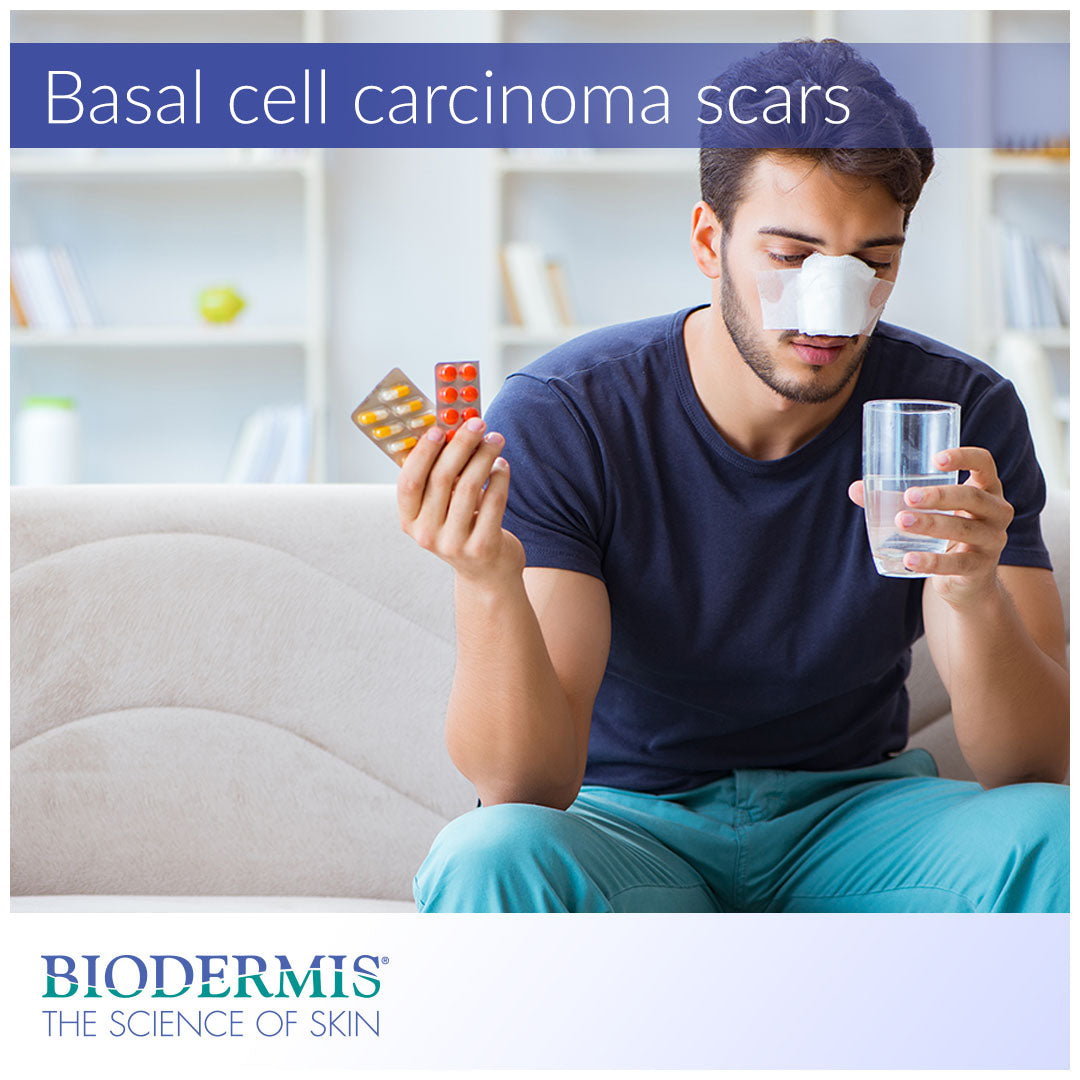Basal cell carcinoma is a type of skin cancer that begins in the basal cells of the skin. This type of skin cancer doesn’t usually spread to other areas of the body because it’s contained in the bottom layer of the epidermis. Basal cell carcinoma is one of the most common types of skin cancer and is easily treatable if caught early on. Depending on the extent of the cancer, a patient may need to undergo surgery to eradicate it. Surgery to remove basal cell carcinoma can leave a noticeable scar on the face or other parts of the body. To reduce post-operative scarring, patients are urged to use medical-grade silicone gel.
Continue reading to learn more about basal cell carcinoma and to discover which silicone products are right for you.
What is basal cell carcinoma?
Similar to other forms of cancer, basal cell carcinoma is characterized by the uncontrolled growth of abnormal cells in the body. Old cells, which typically die off and are replaced with new ones, instead, continue to grow and spread. The mass of tissue that these cells create is called a tumor. Because this form of cancer is found at the surface of the skin, it is often visible as a small, lumpy growth. Most basal cell carcinomas are believed to be associated with too much exposure to UV radiation from the sun. Avoiding extended outdoor activity in the sun and using sunscreen can help prevent the formation of skin cancer.
Diagnosis of skin cancer is usually a straightforward process. Your dermatologist will assess the changes in your skin and check for any symptoms. Basal cell carcinoma can appear as a reddish, scaly patch, a dark blue or black lesion, or a white, scar-like abrasion. Your doctor will likely perform a skin biopsy, which involves extracting a small sample of the affected area and testing it in a lab. Treatment depends on the location and extent of the cancer. Several surgery options are available for removing skin cancer. During surgical excision, your doctor will cut out the cancerous lesion as well as a small portion of healthy tissue surrounding it. This is to ensure all of the cancer has been removed. Mohs surgery, on the other hand, is a slightly less invasive procedure that requires removing the cancerous tissue layer by layer. For some aggressive forms of skin cancer, surgery may be combined with radiation therapy to ensure the cancer doesn’t return.

Post-surgical scar care
Most forms of skin cancer that have been surgical removed will leave at least some scarring. Such scarring is especially prominent if the cancer formed on the face or neck. Genetics and various environmental factors contribute to how a scar looks after the wound has fully healed. Some patients are predisposed to developing keloids and hypertrophic scars and will likely want some way to help prevent or reduce these scars. Medical grade silicone in the form of sheeting, sticks, and ointments, may be the solution.
Topical silicone gel for scars has been the gold standard in post-operative scar therapy for over 30 years. Because medical-grade silicone has been tested repeatedly and is backed by clinical evidence, doctors feel confident recommending products to their patients. Simply and effectively, through dermal hydration and collagen regulation, medical silicone gives users greater control over the way their scars look and feel. In many cases, patients who use silicone gel can’t even tell they had surgery in the first place. To experience similar results, ask your physician about topical silicone for scars or order for yourself online at biodermis.com.
Continue reading to learn more about basal cell carcinoma and to discover which silicone products are right for you.
What is basal cell carcinoma?
Similar to other forms of cancer, basal cell carcinoma is characterized by the uncontrolled growth of abnormal cells in the body. Old cells, which typically die off and are replaced with new ones, instead, continue to grow and spread. The mass of tissue that these cells create is called a tumor. Because this form of cancer is found at the surface of the skin, it is often visible as a small, lumpy growth. Most basal cell carcinomas are believed to be associated with too much exposure to UV radiation from the sun. Avoiding extended outdoor activity in the sun and using sunscreen can help prevent the formation of skin cancer.
Diagnosis of skin cancer is usually a straightforward process. Your dermatologist will assess the changes in your skin and check for any symptoms. Basal cell carcinoma can appear as a reddish, scaly patch, a dark blue or black lesion, or a white, scar-like abrasion. Your doctor will likely perform a skin biopsy, which involves extracting a small sample of the affected area and testing it in a lab. Treatment depends on the location and extent of the cancer. Several surgery options are available for removing skin cancer. During surgical excision, your doctor will cut out the cancerous lesion as well as a small portion of healthy tissue surrounding it. This is to ensure all of the cancer has been removed. Mohs surgery, on the other hand, is a slightly less invasive procedure that requires removing the cancerous tissue layer by layer. For some aggressive forms of skin cancer, surgery may be combined with radiation therapy to ensure the cancer doesn’t return.
Post-surgical scar care
Most forms of skin cancer that have been surgical removed will leave at least some scarring. Such scarring is especially prominent if the cancer formed on the face or neck. Genetics and various environmental factors contribute to how a scar looks after the wound has fully healed. Some patients are predisposed to developing keloids and hypertrophic scars and will likely want some way to help prevent or reduce these scars. Medical grade silicone in the form of sheeting, sticks, and ointments, may be the solution.
Topical silicone gel for scars has been the gold standard in post-operative scar therapy for over 30 years. Because medical-grade silicone has been tested repeatedly and is backed by clinical evidence, doctors feel confident recommending products to their patients. Simply and effectively, through dermal hydration and collagen regulation, medical silicone gives users greater control over the way their scars look and feel. In many cases, patients who use silicone gel can’t even tell they had surgery in the first place. To experience similar results, ask your physician about topical silicone for scars or order for yourself online at biodermis.com.
Biodermis is an innovative market leader with 30 years of expertise in the medical silicone industry. Visit Biodermis.com today to explore a complete range of scar management and post-operative care solutions.
PHYSICIANS AND MEDICAL PROFESSIONALS: REFER OR RESELL?
Biodermis offers custom tailored referral programs designed to simplify and reduce the cost of your patients' post-op care. Additionally, we offer professional pricing if you opt to retail our products. Give us a call at 800.322.3729, and we will be happy to provide additional details on these programs.



